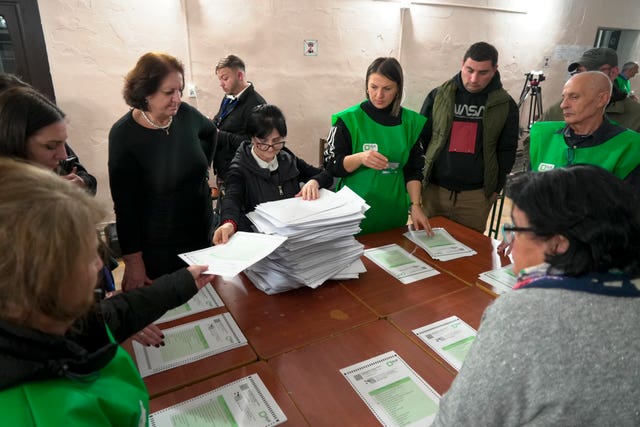Georgia president: Country was victim of Russian ‘special operation’ in election
Salome Zourabichvili said she did not recognise the results of the vote.

Georgia’s president Salome Zourabichvili has said the country was the victim of a Russian “special operation” as she stood alongside Georgia’s opposition to say she did not recognise the results of the vote.
She called on Georgians to come out at 7pm local time on Monday on the main street in the capital to protest against the result, which she said was a “total falsification, total stealing of your votes”.
She spoke the day after an election which could decide Georgia’s place in Europe.
The Central Election Commission said on Sunday that the ruling party, Georgian Dream, got almost 55% of the vote with almost 100% of ballots counted.

European electoral observers said the election took place in a “divisive” environment marked by intimidation and instances of physical violence which undermined the outcome of the vote.
Following a divisive pre-election campaign, initial figures suggest turnout was the highest since the ruling party was first elected in 2012.
Monitoring officials from the Organisation for Security and Co-Operation in Europe said they had multiple concerns about the conduct of the election, including vote buying, double voting, physical violence and intimidation.
Georgian Dream used hostile rhetoric, “promoted Russian disinformation” and conspiracy theories ahead of the election in an attempt to “undermine and manipulate the vote”, said Antonio Lopez-Isturiz White, the head of the European Parliament monitoring delegation.
The conduct of the election is evidence that points to the ruling party’s “democratic backsliding”, he said.
Georgian electoral observers, who were stationed across the country to monitor the vote, also reported multiple violations and said the results “do not correspond to the will of the Georgian people”.
Georgian Dream has become increasingly authoritarian, adopting laws similar to those used by Russia to crack down on freedom of speech. Brussels suspended Georgia’s EU membership process indefinitely because of a “Russian law” passed in June.

Bidzina Ivanishvili, the billionaire founder of Georgian Dream who made his fortune in Russia, claimed victory almost immediately after polls closed, saying: “It is rare in the world for the same party to achieve such success in such a difficult situation.”
He had vowed ahead of the election to ban opposition parties should his party win.
Tina Bokuchava, chairwoman of the United National Movement opposition party, accused the election commission of carrying out Mr Ivanishvili’s “dirty order” and said he “stole the victory from the Georgian people and thereby stole the European future”.
She indicated the opposition would not recognise the results and “will fight like never before to reclaim our European future”.
The UNM party said its headquarters were attacked on Saturday, while Georgian media reported two people were injured in attacks outside polling stations.
The pre-election campaign in the South Caucasus nation of 3.7 million people, which borders Russia, was dominated by foreign policy and marked by a bitter fight for votes and allegations of a smear campaign.
Some Georgians complained of intimidation and being pressured to vote for the governing party.
Georgian Dream scored its highest share of the vote – polling almost 90% – in the Javakheti region of southern Georgia, 83 miles west of the capital Tbilisi – where it failed to get more than 44% of the vote in any district.
Before the election, The Associated Press travelled to the region where many people are ethnic Armenians who speak Armenian, Russian and limited Georgian. Some voters suggested they were instructed how to vote by local officials while several questioned why Georgia needed a relationship with Europe and suggested it would be better off allied with Moscow.
Around 80% of Georgians favour joining the EU, according to polls, and the country’s constitution obliges its leaders to pursue membership in that bloc and Nato.
Many fear Georgian Dream is dragging the country towards authoritarianism and killing off hopes of becoming an EU member.
President of the European Council Charles Michel said he called on Georgia’s officials to “swiftly, transparently and independently investigate” the electoral irregularities and called on the ruling party to demonstrate its “firm commitment” to the EU.
And Hungary’s prime minister Victor Orban was the first foreign leader to congratulate Georgian Dream and will be the first foreign leader to visit Georgia and meet the prime minister when he visits the capital for a visit on Monday and Tuesday.





